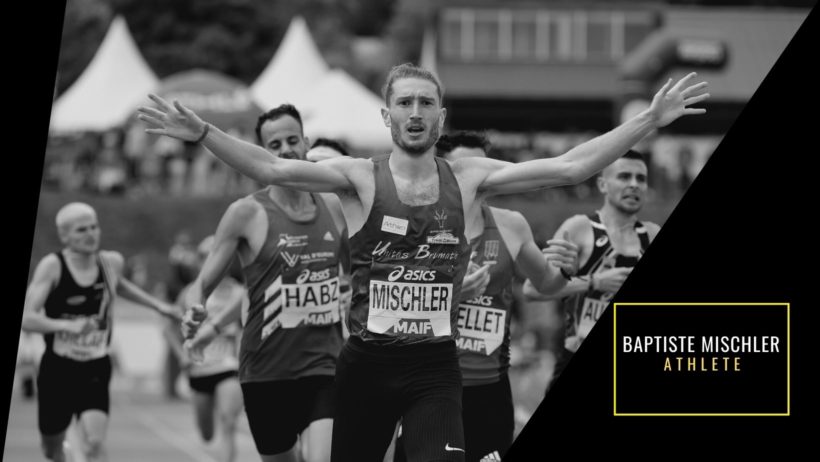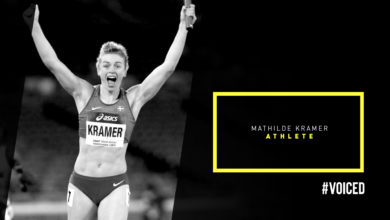Country: France
Profession: Athlete – 1500m
Career highlights:
- 2020 Olympian
- 2021 National Champion
- 2016 Junior World champs – 4th
- 2015 European Junior Championships – 2nd
- 2013 European Youth Olympic Festival – 1st
How do you motivate yourself on days when you just don’t feel like training?
It’s not always easy to go to training on days when you feel you are not in the best shape physically, are not necessarily in the mood or simply just because the weather isn’t nice. I always put things into perspective and remember why I am a professional athlete: this childhood dream of being a full-time athlete, to make my family and loved ones proud. Over time, performance objectives were put in place, now I motivate myself by telling myself that I am working for the major championships and a chance to compete with the best athletes in the world.
Which three words would you use to describe your transition from junior to senior athlete?
Patience: It took me a long time to start performing with seniors. Finishing on a great year 2016 at the Junior World Championships in Bydgoszcz where I finished 4th, I expected that the transition to seniors would be easy. It was much more difficult, I injured myself several times and I no longer had the carefreeness of my young years. It was necessary to work, again and again, to be very patient to be one of the best senior athletes.
Doubts: I questioned and doubted myself a lot during difficult times – injuries and stagnation in my performance. I even thought about quitting athletics. I was lucky to be surrounded by a solid support structure and a competent technical staff to “remove” these doubts and get back on the attack.
Excellence: I understood that to perform at a very high level among seniors, you had to aim for excellence. For me this word is strong since it implies that we are all human, that we are all entitled to make mistakes, to poor performance, but it ensures that we must always be proud of the journey and the daily efforts. In other words, focusing on the positive of our experiences in order to feel good about yourself. This is one of the main drivers of my performance.
What would you say made your partnership with the late coach Hubert Steinmetz so successful?
Sadly, Hubert passed away in June 2020 and he has since left a huge void behind. The secret of the success of these 15 years of collaboration? We had the same character: rigorous, hardworking, and determined. We understood each other without even speaking. We had the same vision of competition: after a successful race, we went straight back to work. We were happy for one evening, then the next day we were already on other goals. We revealed very little of our emotions, but everything was incredibly fluid. We also exchanged often; it is one of the bases of the coach-athlete relationship: communication. For me, he was like a second grandfather. He also taught me, through sport, the values of life and forged my character as a champion.
So many athletes choose not to study when they turn professional, what made you want to pursue a degree in engineering?
From a very young age, I have been passionate about new technologies and the ways our world works. I have always been more scientific than literary; I have a very “Cartesian” brain. So, I had a second dream: to become an engineer. When I finished my scientific baccalaureate (at 18), my parents wanted me to continue studying because athletics did not allow me to earn enough money to live on. I also did not know if I was ever going to be strong enough in athletics.
I enrolled at The Institut National des Sciences Appliquées de Strasbourg (INSA Strasbourg) after my BAC and I had an adjustment of the course to be able to train and follow the courses. I do not regret this decision in any way, because in 2023 I will finally graduate (after 8 years of studying) as an engineer-topographer. At the same time, I was able to compete at the 2020 Olympic Games and participate in other senior championships. When I transition out of athletics I will be able to find a job and live from my second passion. Lastly, I think that on a daily basis, doing something other than sport allows you to have a healthy and stimulating life balance but which goes hand in hand: I have always had a competitive spirit even in my student life. The days are certainly very meticulous, but at least I don’t get bored in my daily life!
Which book would you recommend everyone reads?
I’m not a big reader, but here are 2 books I would recommend:
- My dream of gold and snow (Mon rêve d’or et de neige) by Martin Fourcade
- Run or Die by Kilian Jornet


